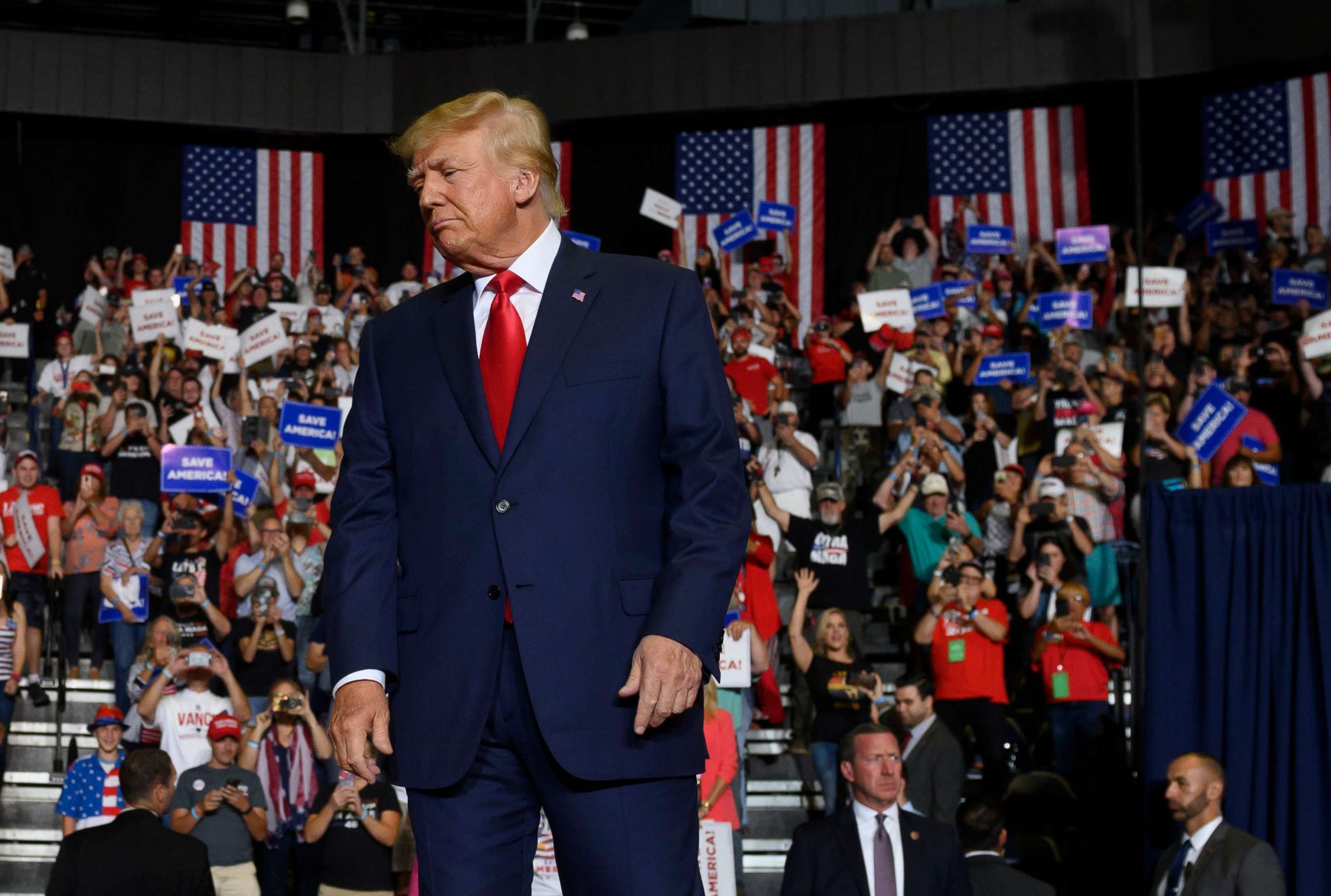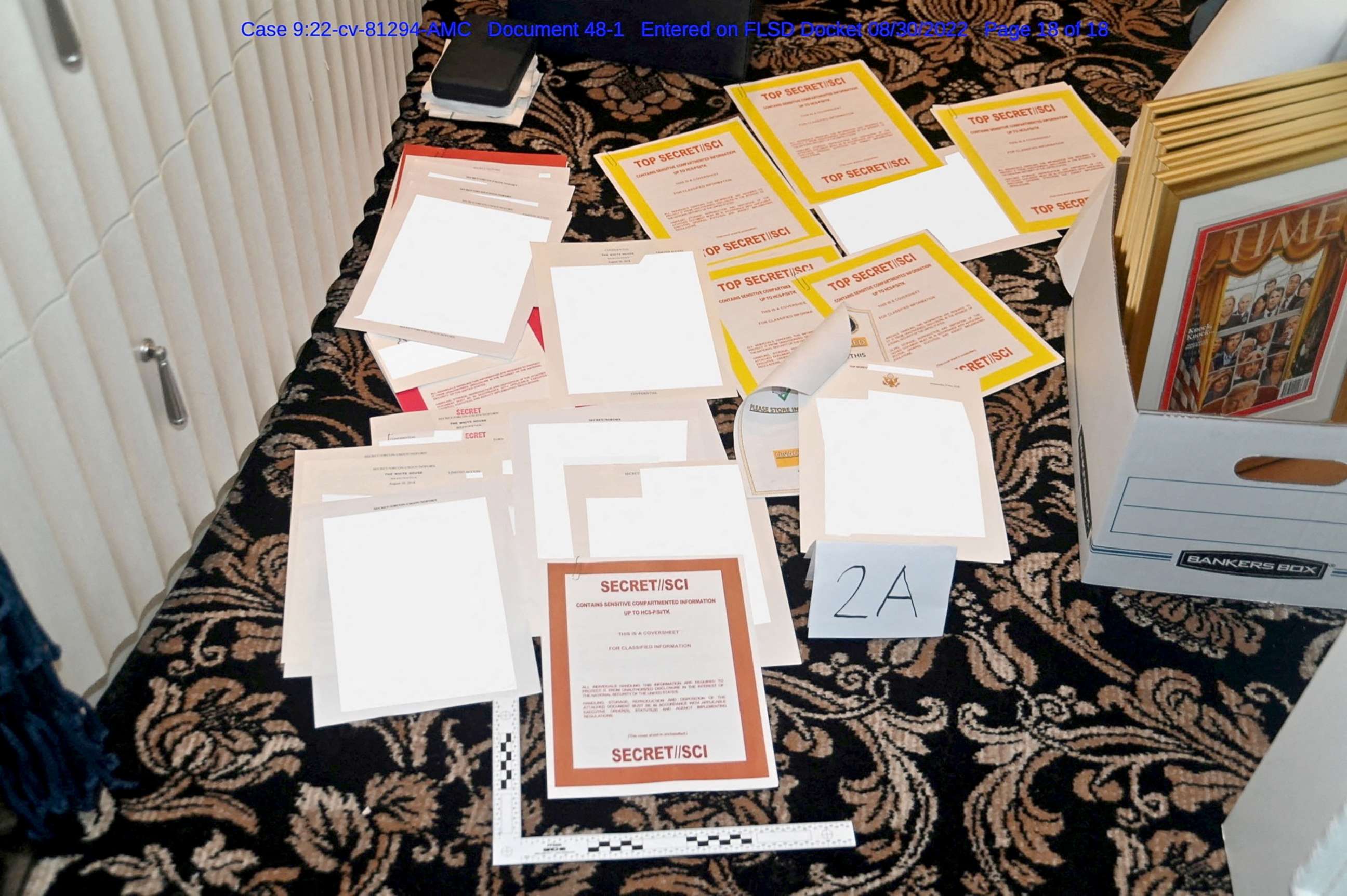DOJ can continue Trump classified docs investigation without special master: Appeals court
The government won't have to submit those seized materials for review.
A panel of judges on the 11th U.S. Circuit Court of Appeals has granted a request from the Justice Department to stay portions of a ruling by U.S. District Judge Aileen Cannon that had effectively paused the government's investigation into former President Donald Trump's potential mishandling of classified records after leaving office.
The three-judge panel, comprised of two Trump appointees and a Barack Obama appointee, ruled unanimously on Wednesday that the Justice Department is no longer enjoined from investigating the documents with classification markings that were recovered from Mar-a-Lago and will no longer have to submit those materials to special master Ray Dearie for his review.
"[Trump] has not even attempted to show that he has a need to know the information contained in the classified documents," the panel wrote in its ruling. "Nor has he established that the current administration has waived that requirement for these documents."
The judges also agreed with the Justice Department that Trump has submitted no record or claim that he ever declassified the documents at issue -- which undercut Trump's statements on social media otherwise. His team resisted stating as much when pressed by Dearie during a separate hearing on Tuesday.
"In any event, at least for these purposes, the declassification argument is a red herring because declassifying an official document would not change its content or render it personal," the judges wrote. "So even if we assumed that Plaintiff did declassify some or all of the documents, that would not explain why he has a personal interest in them."
Earlier this month, Judge Cannon, who was nominated by Trump, granted his request for a special master to review what was taken by the FBI in a court-authorized search of Mar-a-Lago last month.
The special master's review, as ordered by Cannon, was to be for items that might be covered by both attorney-client privilege and executive privilege, even though Trump is no longer the president and has never asserted privilege over any specific records.

Cannon's ruling, which enjoined the government from further use of the seized documents as part of its criminal investigation, was widely criticized by legal experts with a range of political views -- including Trump's former Attorney General William Barr.
"The Court hereby authorizes the appointment of a special master to review the seized property for personal items and documents and potentially privileged material subject to claims of attorney-client and/or executive privilege," Cannon wrote. She cited "the need to ensure at least the appearance of fairness and integrity under the extraordinary circumstances presented."
In a filing earlier this week, Trump's legal team urged the appellate court not to grant a stay, arguing in part: "The District Court did not err in temporarily enjoining the Government's review and use of records bearing classification markings for criminal investigative purposes because the merits support that narrowly tailored injunction." The Trump attorneys called the government's investigation "both unprecedented and misguided" and repeated their claim that it was merely "a document storage dispute that has spiraled out of control."
The 11th Circuit panel ruled Wednesday that they don't believe Trump would risk irreparable injury if Cannon's order is partially stayed because he has not asserted attorney-client privilege over any of the documents at issue with classification markings.
The three judges undercut Cannon directly as well, noting the government is "substantially likely to succeed" in showing she "abused [her] discretion in exercising jurisdiction over [Trump's] motion as it concerns the classified documents."
"The engrained principle that 'courts must exercise the traditional reluctance to intrude upon the authority of the Executive in military and national security affairs' guides our review of the United States's proffered national-security concerns," the appellate judges wrote.
The Justice Department previously requested that Cannon partially stay her order, relating to the special master and review of classified documents. But she rejected that motion and the government sought an appeal.
Cannon, in denying the government's request of a stay, wrote that she was not willing to accept their assertions that the roughly 100 documents taken from Mar-a-Lago were classified -- even though they were labeled as such, with some bearing "SECRET" and "TOP SECRET/SCI" markings.

"The Court does not find it appropriate to accept the Government's conclusions on these important and disputed issues without further review by a neutral third party in an expedited and orderly fashion," Cannon wrote in her rejection.
She approached with heavy skepticism the government's arguments about the documents with classified markings and the government's claims that Trump has no right to the materials at all.
In its motion last week for a partial stay from the 11th Circuit, the Justice Department argued that Cannon "has entered an unprecedented order enjoining the Executive Branch's use of its own highly classified records in a criminal investigation with direct implications for national security."
And while Cannon ruled that the intelligence community could continue its own assessment of the possible national security risks from Trump's handling of the documents, the government said in court papers that such a separation was not feasible.
The 11th Circuit judges agreed with the Department of Justice.
They wrote in their Wednesday ruling that Cannon's effort to distinguish the intelligence committee's classification review from the FBI's own criminal investigation was "untenable" and that they believe the FBI has "sufficiently explained how and why its national-security review is inextricably intertwined with its criminal investigation."

"No party has offered anything beyond speculation to undermine the United States's representation—supported by sworn testimony—that findings from the criminal investigation may be critical to its national-security review," the judges wrote. "According to the United States, the criminal investigation will seek to determine, among other things, the identity of anyone who accessed the classified materials; whether any particular classified materials were compromised; and whether additional classified materials may be unaccounted for. As [Trump] acknowledges, backwards-looking inquiries are the domain of the criminal investigators."
"It would be difficult, if not impossible, for the United States to answer these critical questions if its criminal investigators are not permitted to review the seized classified materials," they added.
In another rejection of Cannon's assessment, the judges wrote that they agreed with the government's arguments that allowing special master Dearie, as an outside third-party, to examine the classified records with Trump's legal team could "impose irreparable harm."
"The Supreme Court has recognized that for reasons 'too obvious to call for enlarged discussion, the protection of classified information must be committed to the broad discretion of the agency responsible, and this must include broad discretion to determine who may have access to it,'" they wrote. "As a result, courts should order review of such materials in only the most extraordinary circumstances. The record does not allow for the conclusion that this is such a circumstance."
Former President Trump could seek to appeal to the full 11th Circuit Court of Appeals or even potentially the Supreme Court, but it's unclear how long it would take either to act on their appeal while the Justice Department has access to the documents.
ABC News' Jack Date contributed to this report.




